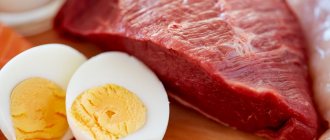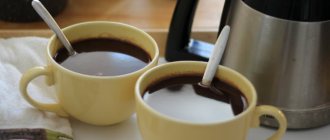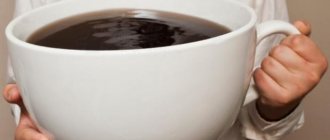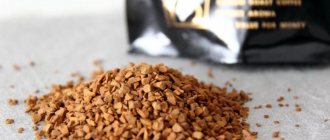Professional skills: Colon hydrotherapy, treatment of gastrointestinal diseases
Have you noticed that you often have intestinal upset and diarrhea from coffee? The cause of the malaise can be either the negative impact of the drink’s components on the gastric mucosa or the improper use of the product. It is best to understand the problem more thoroughly in order to eliminate possible factors that provoke diarrhea.
Why does coffee cause diarrhea?
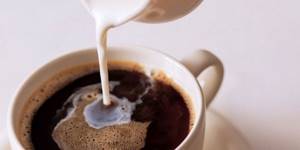
“Tones, invigorates, gives energy” - these are the epithets that avid coffee lovers usually use when talking about coffee. Indeed, tonic liquids contain a lot of useful substances: tannin, caffeine, organic acids. But it should be taken into account that the product affects the mucous membrane of the gastrointestinal tract, and not always positively.
Natural ground coffee beans contain up to 30 organic acids. In concentrated form, they irritate the gastric mucosa, which leads to abdominal pain and diluted stool due to poor digestion of food.
Especially often people who prefer to drink instant drinks complain of ailments. In it, the natural components of the drink can be replaced with synthetic, more aggressive ones. Diarrhea that appears after instant coffee is characterized by an unpleasant odor and wateriness. In addition, even a healthy person can experience symptoms similar to poisoning: dry mouth, nausea, headache.
It must be remembered that coffee affects the entire body. If you regularly drink the drink, even in small doses, on an empty stomach, you can also cause indigestion. The main reason is the adrenaline rush caused by the product. Because of this hormone, coffee can cause diarrhea, since the incoming product is perceived by the body as a toxin.
Gastroenterologists also note other causes of diarrhea after drinking the drink:
- Unsuccessful product temperature . Both too hot liquid and excessively cooled liquid have a negative effect. Therefore, diarrhea after coffee can appear literally half an hour after consuming the product.
- Adding milk to a tonic drink . Often, diarrhea after coffee with milk occurs in people suffering from lactose intolerance.
- Ingestion of grounds into the stomach . Particles of grains irritate the gastrointestinal mucosa, causing diarrhea.
- Allergy to product components . Diarrhea can also be caused by flavorings that are added to both ground and instant coffee.
Any adult may develop loose stools if they drink too much of a tonic drink or drink coffee during significant emotional overload, or during a weakened body caused by illness.
How does coffee cause diarrhea?
Many people are surprised that coffee can make diarrhea worse. There are several theories as to how coffee causes diarrhea. The type and quality of the drink, its strength, and the presence of additives play a big role in this.
Can you drink coffee on an empty stomach?
You should not drink coffee on an empty stomach - this will increase the effect of its acids and caffeine on the mucous membranes. Moreover, if you drink it with milk and sugar, then in addition to stomach irritation, the liver and pancreas will suffer.
What you need to know about adding sugar to coffee
The drink draws water onto itself, especially when combined with sugar. This causes its influx into the intestinal lumen. In addition, the body tries to eliminate caffeine, perceiving it as a toxin, and releases water into the intestines, triggering peristalsis. Combined with irritation of the mucous membrane, all this leads to diarrhea after coffee.
Hot or cold?
Additionally, too hot or cold coffee can stimulate diarrhea. It disrupts gastrointestinal motility, which makes digestion difficult.
Coffee with milk. Is this useful?
Coffee with milk puts a lot of stress on the glands (liver and pancreas) - if they do not secrete enough enzymes to break down milk fats and protein, diarrhea, vomiting and bloating may develop. Also, milk or cream can dilute food in the stomach, making it thinner, which also leads to diarrhea.
About coffee grounds
Hand-brewed bean coffee can cause upset due to the grounds from the drink getting into the stomach. The thicket irritates its walls mechanically and chemically (due to acids).
Should you drink coffee if you have diarrhea?
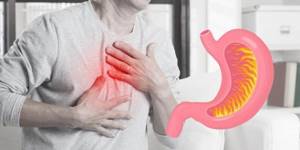
There is an opinion that you can drink coffee when you have diarrhea, as this drink has strengthening properties. Chlorogenic acid has an astringent effect on the gastric mucosa. But its quantity is not enough to achieve an antidiarrheal effect. Therefore, coffee does not help get rid of diarrhea. Rather, the drink has a beneficial effect on the genitourinary system, as it has a diuretic property and can speed up the removal of toxins from the body.
Important! Although coffee stimulates the removal of urine from the body, this effect is only partially positive. Caffeine-containing drinks dull the feeling of thirst, which can lead to dehydration.
Often, with diarrhea of any origin, only the negative properties of coffee appear in humans. Why is this happening? If the patient decides that he can drink a tonic drink for diarrhea, one must not forget about some nuances.
The most common mistakes:
- Poorly chosen drink recipe . Several tablespoons of soluble powder or ground grains are placed into a cup at once, achieving a strong strength of the product. This leads to excessive irritation of the intestinal mucosa.
- Adding milk . If pure, weakly brewed coffee can still be consumed with loose stools, then a drink with milk will definitely aggravate the patient’s condition. Milk is too heavy a product; the body, weakened by intestinal ailments, cannot digest it.
- Large amounts of sugar . For eating disorders, granulated sugar is often added to drinks in large quantities, hoping to restore blood glucose levels. In fact, a patient drinking sweet coffee provokes increased gas formation and heartburn.
- Incompatibility of the product with medications . The caffeine contained in the beans cannot be combined with some antibiotics and antipyretics (for example, Citramon), as this may enhance or weaken the therapeutic effect of the drugs.
The tonic product should be used with caution, noting any changes in condition. If the patient does not know whether he can drink coffee during diarrhea, it is better not to risk it and give preference to tea or safer herbal decoctions and infusions.
Is it possible to drink coffee if you have diarrhea?
If a person is completely healthy, drinking this drink will not lead to negative consequences. On the contrary, coffee will saturate the body with amino acids and proteins . At the same time, you should not drink coffee if you have an upset stomach, diarrhea, or other disorders of the gastrointestinal tract, given the high probability of worsening the situation and providing a laxative effect.
This adverse reaction develops due to the presence of microelements in coffee that irritate the intestinal surface. In this regard, it is recommended to avoid drinking coffee if you have diarrhea. In addition, the active components of the product are capable of:
- increase blood pressure readings;
- increase the rhythm of the heartbeat;
- cause swelling and fluid retention in soft tissues.
The highest risk of diarrhea is from drinking coffee with milk. Such a drink will lead to a sharp increase in episodes of diarrhea and a longer course of intestinal distress.
How to reduce the negative effects of coffee
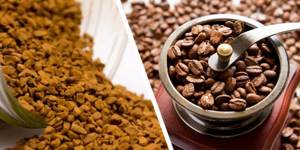
Many people get used to drinking a cup of coffee every morning. If you don’t have the strength to give up aromatic espresso even with an intestinal upset, it is better to try to minimize the damage that the drink will cause to the body.
To avoid developing diarrhea from coffee, follow these rules:
- Discard the instant product . Some substances contained in the powder mixture have a particularly aggressive effect on the gastric mucosa.
- Reduce the number of tablespoons of ground grains brewed with boiling water. This will help reduce the amount of caffeine entering the body.
- Prepare a drink in a coffee machine, coffee maker . Since the grounds, when ingested, enhance intestinal motility, the likelihood of them getting into the cup should be reduced. If you cook ground grains in a Turk, fill them with a large amount of liquid, and be sure to strain them after cooking.
- Eat . People who wonder if coffee is okay for diarrhea forget that in the first days of a severe eating disorder you practically don’t feel like eating. And coffee contains substances that have a negative effect on an empty stomach. In order not to cause damage to the body, it is better to drink a tonic drink after a meal.
If you have diarrhea, you can drink coffee, but in small quantities. And only when you are sure that the malaise was not caused by the drink itself. To determine what exactly led to the liquefaction of the stool, it is necessary to undergo diagnostic methods recommended by the gastroenterologist: ultrasound of the abdominal cavity, blood and urine tests, and stool tests for coprogram.
When should you not drink coffee?

There is a category of patients for whom coffee for diarrhea is strictly contraindicated. A person can drink espresso and cappuccino every day without any problems. But, if a digestive disorder has developed, in some situations the use of a tonic product may worsen the patient’s condition.
You should not drink coffee in the following cases:
- Increased heart rate.
- The appearance of heartburn, bloating.
- Severe pain in the side, near the navel, lower abdomen.
- The appearance of blood and a large amount of mucus in the feces.
- Temperature rise above 38ºC.
- Headaches, dizziness.
- Profuse vomiting.
If you notice that you have diarrhea within half an hour of drinking espresso, stop drinking the drink for a while. When the condition stabilizes, try introducing the product gradually, reducing the portions of the product and the concentration of ground grains.
Important! Children and adolescents under the age of 16 should not drink caffeine-containing liquids, as they have a negative effect on the nervous system. In addition, drinking coffee can lead to the development of acute poisoning in a child.
In what cases is it permissible to drink coffee?
An invigorating drink does not always have a negative effect on the body and increases the intensity of attacks of diarrhea. Only a product made from coffee beans can provoke undesirable consequences. Acorn or barley coffee for diarrhea is a useful remedy to cope with the problem. The active components contained in acorns or barley grains have remarkable qualities:
- improve the functioning of the digestive organs;
- cleanse the intestines of toxins that cause loose stools;
- normalize metabolic processes;
- strengthens feces;
- relieve the load on the pancreas;
- eliminate increased gas formation and cramps;
- destroy harmful microorganisms;
- relieve unpleasant discomfort in the abdominal area.
Attacks of diarrhea often provoke inflammatory processes in the intestines, which bring additional troubles. A remedy made from acorns or cereals actively affects the source of inflammation, stopping its growth.
How can you replace coffee without harming your health?
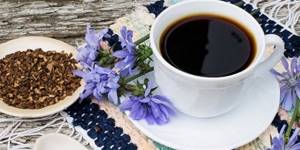
You can avoid consuming caffeine by replacing coffee with other products that are similar in taste. Some of them even act as effective remedies for diarrhea.
Such drinks are prepared from:
Chicory successfully replaces caffeinated drinks. It is available in liquid or powder form. Chicory does not have a negative effect on the stomach and intestines; even pregnant women and people suffering from diabetes can drink it.
Rye and wheat mixtures taste like coffee; they drink several cups a day without fear of developing intestinal ailments. You can brew ground rye and wheat in a Turk.
Products based on acorns and barley have a strengthening effect, so they are even recommended to drink for diarrhea. An infusion of dried acorns is especially good for getting rid of diarrhea, since it contains tannins that stabilize peristalsis. The main thing is to prepare the infusion correctly, adding a small amount of sugar and avoiding milk.
Always pay attention to the general condition of the body. If you experience tachycardia, nausea or problems with stool when drinking coffee drinks, it is better to avoid them. The best option for diarrhea is to drink water, black or green tea, as well as herbal infusions.
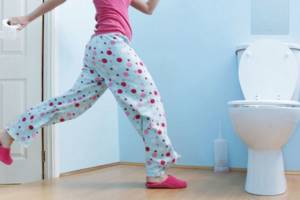
Often, after a cup of aromatic coffee, a person experiences an upset stomach, accompanied by diarrhea (diarrhea). Observations of others, on the contrary, indicate that the same drink helps cope with diarrhea. In order to find out who is right, it is necessary to take a closer look at the effects of caffeine on the human body.
Is diarrhea (diarrhea) possible if you drink coffee and why?
If a person does not have problems with the gastrointestinal tract or constant constipation, then moderate consumption of the drink does not cause problems in the form of loose stools. But even in such a situation, it is necessary to drink a coffee drink after eating.
Excessive use of caffeine, including on an empty stomach, causes diarrhea. This is especially true for people suffering from chronic diseases of the gastrointestinal tract. In this case, problems certainly cannot be avoided. Nausea, gag reflexes, and loose stools occur within a short period of time after drinking a coffee drink.

A healthy person may also experience an upset stomach after drinking coffee.
In a healthy person, a cup of coffee can cause diarrhea due to prolonged stress, fatigue or lack of sleep.
Nutrition for diarrhea
The therapeutic diet for such a delicate problem raises many questions - it is quite strict, associated with the restriction of many familiar dishes and products. It’s not clear - is it possible to eat eggs, cereals, cottage cheese, nuts? What should coffee lovers do? Is it possible to drink coffee if you have diarrhea and should you add milk to your favorite drink? What about sweets? Is honey and sweet tea okay for loose stools?
Food, the products included in dishes, are not just sources of necessary substances. Almost every component has its own effect on the functioning of the gastrointestinal tract and its peristalsis. Thus, carbohydrates increase fermentation, which in itself leads to frequent bowel movements. There are a lot of carbohydrates in sweets, baked goods (even unsweetened ones), and in porridges made with full-fat milk7.
Protein foods, on the contrary, somewhat slow down bowel movements, which is often manifested by a decrease in the frequency of bowel movements during diarrhea7.
Legumes (all types of peas, beans), cruciferous vegetables (cabbage, radishes, radishes, etc.) cause flatulence, which in turn stimulates intestinal motility and causes early and rapid excretion of feces7.
Limiting foods that cause certain undesirable consequences is called sparing the gastrointestinal tract. It is divided into:
- mechanical. They “remove” components that make the intestinal walls move faster. This is coarse fiber from vegetables, fruit peels, poultry or fish skin. Both adults and children can and should eat bananas for diarrhea - it has puree-like pulp, which eliminates the need for additional processing of the product, and the pulp contains a lot of potassium. It is necessary for diarrhea to reduce the risk of dehydration2,4,7;
- thermal. Too hot food speeds up, and cold food slows down the movement of the food bolus through the gastrointestinal tract2,4,7;
- chemical. Foods that contain substances that negatively affect the body during illness are excluded from the diet2,4,7. So, diarrhea can be affected by dried fruit compote, milk (especially milk sugar in its composition), extractive substances from broths (they stimulate the release of enzymes that irritate the intestines), etc.2,4,7. For this reason, for diarrhea, only young or low-fat and mild cheese is allowed; the rest will increase peristalsis and irritate the mucous membrane.
But you can’t just limit your diet. The body needs food vitally: it is necessary to maintain the balance of the internal environment and the functioning of organs and systems, and to have the strength to fight diarrhea and its consequences. Therefore, refusing food during diarrhea is a mistake and in some cases even dangerous.
Specially designed diets that are recommended for certain diseases, including stool disorders, take into account all factors. They are somewhat poorer compared to the diet familiar to most people, but they still provide everything necessary for the body to function.
But with any diet, even a specially designed one, an individual approach is needed. So, for diarrhea, kefir can only be not sour and according to tolerance - for some, any kefir increases diarrhea, although in general, with loose stools, it is recommended to drink yoghurt, kefir, and thermostatic yogurt.
Below is a detailed description of nutrition for diarrhea in adults: the diet is shown, an example menu is given and a list of what you can eat during and after diarrhea2,7.
What foods can you eat if you have diarrhea?
Anything that meets the principles of rational nutrition reduces stress, helps relieve inflammation, but at the same time provides the body with all the necessary nutrients.
What not to eat if you have diarrhea
Avoid foods that increase intestinal motility, irritate the intestinal mucosa, increase dehydration, put a strong strain on the gastrointestinal tract, and cause gas formation.
Does the drink help or not?
Coffee and tea contain tannins, which have an astringent effect. Knowing this, many try to treat indigestion with strong coffee. But the drink causes the opposite effect. This is due to the fact that the intestines are already irritated, and drinking a cup of strong drink enhances the effect. The condition is significantly worsening.
There is another factor why you should not drink coffee if you have diarrhea. In this state, the body is dehydrated, and caffeine has a diuretic effect. Therefore, it is better to drink plenty of water rather than a strong drink.
When can I take it?
It is a proven fact that drinking coffee during diarrhea is contraindicated. But there is an exception when a drink can help. This is coffee made from acorns and barley. These two remedies help with diarrhea.
These drinks can only be called coffee because of their similar taste. The effect on the body differs from the original one. They have fixing properties and have a beneficial effect on peristalsis.
Coffee made from acorns contains more than 60% starch. It coats the intestinal walls. Due to this, the load on the pancreas is reduced. Diarrhea stops.
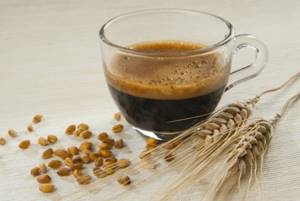
Barley drink will help get rid of bloating, infections, parasites
Drinks made from barley and stomach contain a substance called quercetin. It helps get rid of the formation of cramps, gas, and bloating.
Coffee also gets rid of certain types of intestinal parasites, bacteria and infections.
When does coffee help with diarrhea? When can you drink it for diarrhea?
Coffee is not recommended for use during diarrhea due to the fact that it enhances digestive processes and has a chemical composition unfavorable for this ailment. For people who cannot go a day without an invigorating drink, a substitute can be its analogue, made from acorns, which, in addition to its pleasant taste, also has binding properties.
In terms of benefits for the body, the drink is much healthier than Arabica or Robusta. Acorns contain substances that quickly normalize the functioning of the gastrointestinal tract. More than half (65%) of acorn coffee is starch. Thanks to its enveloping properties, diarrhea quickly stops. A high concentration of starch does not create a strong load on the pancreas, since it is quickly broken down under the influence of other enzymes. Quercetin, present in such coffee, acts as a strong antispasmodic, quickly eliminating pain caused by increased gas formation, bloating and spasms. A secondary role is played by proteins and carbohydrates, thanks to which the optimal amount of elements that ensure metabolism is restored. Tannins help eliminate spastic processes that occur during diarrhea.
In addition, acorns contain a number of components with powerful antibacterial properties. This allows the body to overcome intestinal infections on its own, without the use of antibiotics. A tonic drink made from acorns is used for both acute and chronic intestinal disorders. Thanks to its ability to coat mucous membranes and heal inflammation, acorn coffee is deservedly considered one of the best alternative medicines used for diseases of the digestive system, accompanied by loose stools. It is obvious that the composition of this substitute for natural coffee is several times superior to it in terms of benefits for the body.
Using acorn coffee for loose stools
Acorn coffee should be used at the first sign of diarrhea. To do this, pour 1 tablespoon into 100 ml of boiling water. Let it brew a little and take it, drinking in small sips.
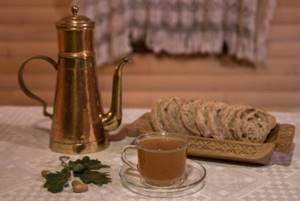
Before using coffee substitutes, you should consult your doctor.
But even natural products have contraindications that must be taken into account to avoid additional problems:
- Coffee will not help and if used for a long time without consulting a doctor, it can be dangerous if the loose stool contains blood. In such a situation, drug treatment is necessary, and therefore contacting a specialist is mandatory.
- You should not try to treat yourself with a drink if diarrhea is accompanied by a high temperature or shortness of breath. These are alarming symptoms that require seeing a doctor.
- The drink is contraindicated for children under 16 years of age. Can be used in treatment only after consultation with a pediatrician or infectious disease specialist.
- You should not start taking coffee if your stomach upset lasts for more than a week.

Use coffee wisely without harming your health
If diarrhea does not stop within several days of regularly drinking acorn coffee, you should stop taking the drink and consult a doctor.
Undoubtedly, a cup of aromatic coffee in the morning invigorates and energizes you for the whole day. But this is only if it is used correctly. If you have problems with the gastrointestinal tract, caffeine must be completely eliminated from the diet until complete recovery. The exception is natural drinks made from acorns and barley. They will not only help cope with diarrhea, but also improve intestinal function.
Stool disorder can manifest itself as a result of disruption of the gastrointestinal tract; disruptions occur due to intoxication, concomitant diseases or food poisoning. Let's find out whether you can drink coffee if you have diarrhea or constipation.
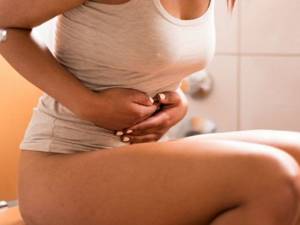
Unfortunately, sometimes health fails. Abnormal bowel movements that catch a person at the wrong moment disrupt all plans. They bring a lot of inconvenience and unpleasant sensations: bloating, pain. As a result, you have to carefully select foods and drinks to consume. Some should be avoided altogether, including strong natural coffee. After all, coffee does not have a fixing effect for diarrhea. On the contrary, it has an irritating effect on the intestinal walls and stimulates loose stools.
Pica (eating chalk, clay, earth)
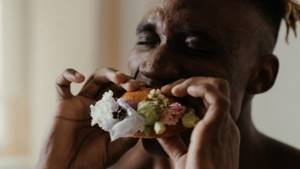
The disorder is included in the Diagnostic and Statistical Manual of Mental Disorders (DSM-5) and is defined as the persistent consumption of nonedible substances for at least one month. Translated from Latin, “pica” means “magpie” - an omnivorous bird. A common phenomenon related to pica is eating chalk by pregnant women (in this case, we are talking about calcium/iron/zinc deficiency, and not about mental disorders). This also includes trichophagy (eating hair), geophagy (eating earth). Ligno- and xylophagy (eating tree bark and branches) is another variant of pica. Along with other types of perversions, it occurs due to a deficiency of microelements or mental disorders (schizophrenia, obsessive-compulsive disorder). If pica occurs, consult a general practitioner or pediatrician. You may be prescribed a comprehensive blood test for vitamins and microelements. In some cases, consultation with a psychotherapist or psychiatrist may be required.
Chemical component of coffee
Despite all the warnings, coffee lovers do not stop drinking coffee if they have diarrhea. Thus exacerbating the problem. Yes, the benefits of the drink are striking, but in some situations it can be harmful. To understand how its effect on body systems occurs, it is necessary to study its components.
Coffee beans contain large amounts of caffeine. The component stimulates the nervous system, gives vigor and physical endurance to a person. Strong espresso contains a substance rich in B vitamins - nicotinic acid, which takes part in the metabolic system.
Trigonelline gives a pleasant bright smell to the drink when heated; the component belongs to the group of alkaloids. Mental activity is stimulated by tannins and microelements (magnesium, calcium, potassium).
When a person does not have health problems, even a double espresso will not harm him. The drink will enrich his body with many microelements, amino acids, proteins, and vitamins. They will improve the functioning of the metabolic system and increase metabolism.
If a patient has an exacerbation of diseases of the gastrointestinal tract (diarrhea, constipation), then coffee acts as a laxative due to its high content of microelements. They irritate the walls of the stomach and intestines and cause diarrhea after coffee.
If you have diarrhea, then drink warm tea as a drink that restores normal processes in the intestines. After all, coffee weakens the stool.
Chemical composition of coffee
Before answering the question about the benefits and harms of coffee during diarrhea, you should understand its composition, which is determined by the presence of microelements such as:
Caffeine is a substance that has a stimulating effect on the nervous system. It is thanks to him that after a cup of aromatic drink a person becomes cheerful, active and has physical endurance. Nicotinic acid is responsible for replenishing the deficiency of B vitamins involved in metabolic processes. Trigonelline is an alkaloid that, when exposed to high temperatures, is capable of releasing a bright, specific aroma that distinguishes coffee from other drinks. Tannins and trace elements (potassium, calcium, magnesium) – promote mental activity.
In the case when a person is completely healthy, coffee can become a real invigorating drink that can enrich the body with essential proteins, amino acids and microelements. The latter, in turn, participate in metabolic processes, normalizing and accelerating them, increasing metabolism.
However, during a period when there is a disorder in the gastrointestinal tract, coffee can only worsen diarrhea. This “anti-effect” is achieved due to the increased content of microelements that can irritate the mucous membranes of the gastrointestinal tract and also exhibit a laxative effect.
As a result, taking such a drink can only increase diarrhea, significantly aggravating its course.
Causes of diarrhea
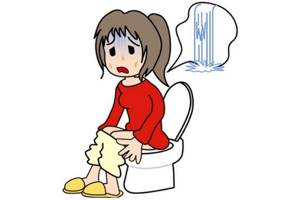
The causes of diarrhea may be the following:
- Poisoning from low-quality products.
- Exacerbation of gastrointestinal diseases as a result of dietary disorders.
- Infection with parasites that infect the intestines.
- Excessive consumption of foods containing sucrose.
- Bacterial lesions of the gastrointestinal tract.
With diarrhea, the gastrointestinal tract malfunctions and the absorption of fluid and microelements is disrupted. Loose stools occur when:
- Damage to the mucous membranes of the stomach and intestines. If the mucous membrane is inflamed or its integrity is compromised, then fluid is retained in the intestines. And its excess does not allow the nutritional components to be properly absorbed. Feces are formed. Compounds are formed that develop excessive osmotic activity. A high glucose content, for example, contributes to disturbances in fluid metabolic processes and dilution of chyme.
- Infections with harmful bacteria or other microorganisms. Damage to the intestinal walls by bacteria leads to flatulence; pathogenic microorganisms also accumulate on the walls and cause disturbances in the passage of feces.
- Strengthening the peristalsis of contractions of the intestinal walls. Increased peristalsis has a negative impact on food absorption. Food is not digested as it should be due to rapid movement along the inner surface of the intestines.
- Increased amount of liquid in chyme and excess microelements.
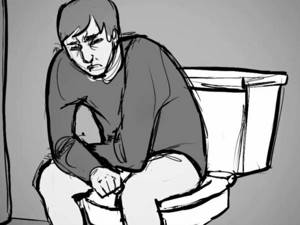
Doctors strongly do not recommend drinking coffee if you have diarrhea. The drink will not only aggravate gastrointestinal disorders, but will also worsen the general condition of the patient. The patient will experience headaches, swelling, increased blood pressure, and heart rhythm disturbances.
If diarrhea continues for a long period of time, you should not self-medicate. Contact a specialist for help.


